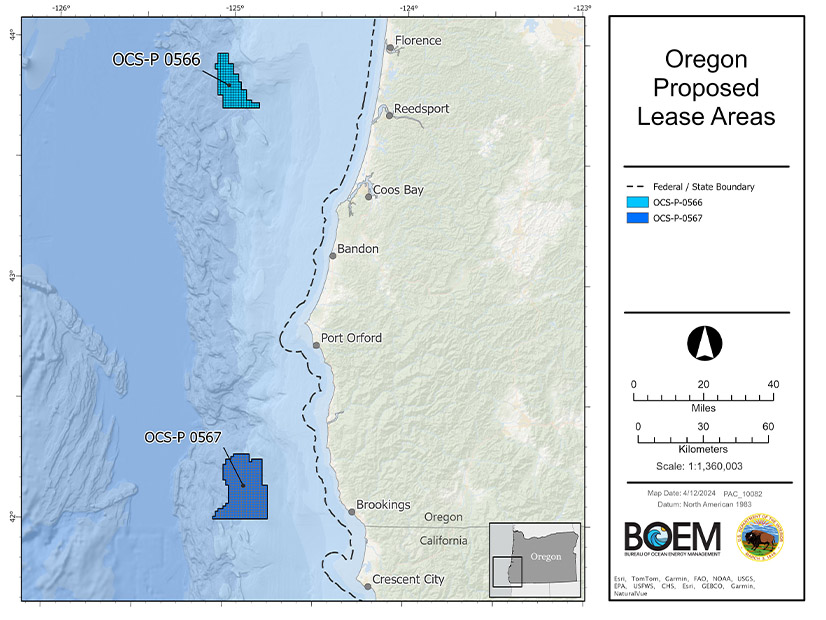
The U.S. Bureau of Ocean Energy Management has concluded that leasing areas off the Oregon Coast for wind energy development would have no significant environmental impact.
BOEM announced completion of its final environmental assessment Aug. 13. The move paves the way for an auction this year of two areas totaling 195,000 acres with a potential generation capacity of more than 2 GW.
The Oregon auction was to be one of four 2024 offshore wind auctions.
The first Central Atlantic lease auction will start at 9 a.m. Aug. 14. (See BOEM Sets Central Atlantic OSW Auction for August.)
Auctions are targeted for October in the Gulf of Maine and Oregon. (See Wind Energy Lease Areas Designated in Gulf of Maine, Oregon.)
The second Gulf of Mexico auction was to be held in September but was canceled for lack of competitive interest. (See BOEM Cancels Gulf of Mexico Wind Lease Auction.)
The proposed Brookings Wind Energy Area totals 133,792 acres and sits approximately 18 miles from the southern Oregon shoreline near the California border. The proposed Coos Bay Wind Energy totals 61,203 acres approximately 32 miles offshore, closer to Reedsport and Florence than to Coos Bay.
Both areas are deep enough that floating wind turbine technology would be needed.
The environmental assessment completed by BOEM does not look at the impact of these turbines or their mooring systems and transmission infrastructure. It covers the survey work a leaseholder would conduct while preparing a construction proposal.
And the assessment found this work would have no significant impact on people or the environment.
Mixed support and opposition have greeted the plan to exploit Oregon’s coastal waters for wind power generation, much as plans elsewhere in the U.S. have. (See BOEM Designates Wind Energy Areas off Oregon Coast.)
BOEM has said it took comments into account as it refined the proposed wind energy areas, shrinking the initial call areas from 1.15 million acres and shaping them to reflect concerns voiced in the comment process.
In a news release, BOEM Director Elizabeth Klein said: “BOEM relies on the best available science and information for our decision-making regarding offshore wind activities. Working with Tribes, government partners, ocean users and the public, we gathered a wealth of data, diverse perspectives and valuable insights that shaped our environmental analysis. We remain committed to continuing this close coordination to ensure potential offshore wind energy leasing and any future development in Oregon is done in a way that avoids, reduces or mitigates potential impacts to ocean users and the marine environment.”
BOEM next will publish a final sale notice for the Oregon areas.



